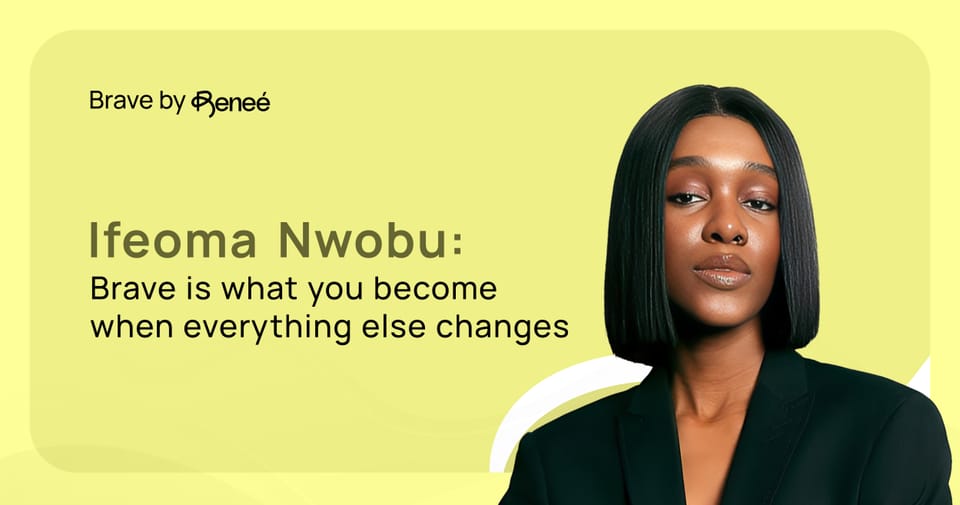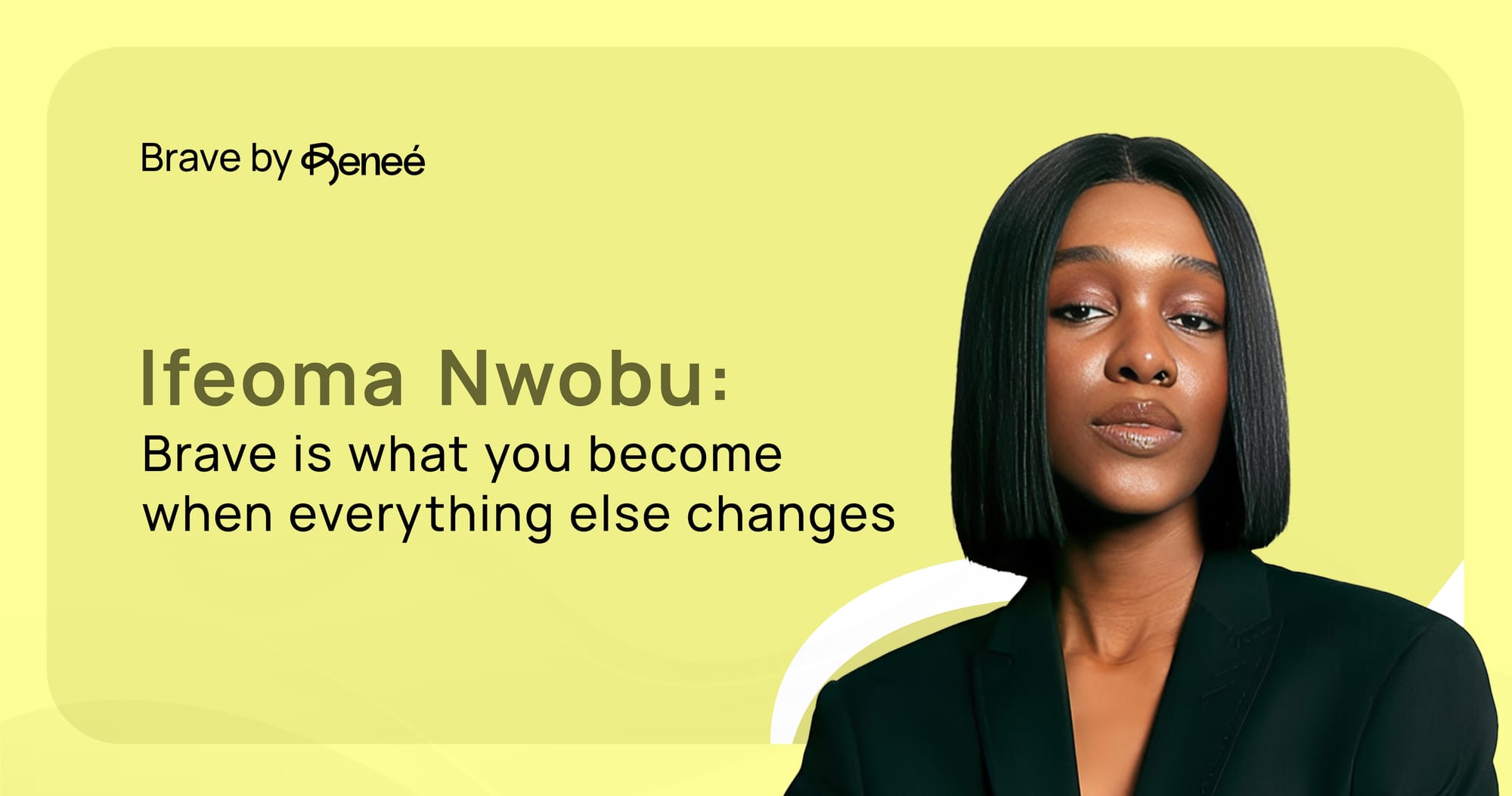Ifeoma Nwobu: Brave is What You Become When Everything Else Changes


While speaking to Ifeoma Nwobu, I get a mental image of roots, specifically, the roots of the Shepherd tree. I learned from a documentary that this tree has been reported to have roots reaching depths of over 200 feet (60 meters). Native to dry and harsh landscapes, the Shepherd tree thrives not by fighting its environment, but by anchoring itself deeply and drawing sustenance from within.
This steadiness mirrors Ifeoma's journey through the many lives she has lived. From fashion to tech, she has worn many hats: building businesses, co-founding a startup, and gracefully stepping away when it no longer aligned with her goals. She has written essays, led teams, and commanded stages. Yet through it all, these milestones aren’t the moments that define her story; they are simply the backdrop.
Ifeoma grew up in a large family, raised primarily by her father alongside five siblings. She describes her early life as an interesting one. Interesting because it was right in the middle of the good and hard, most significantly marked by the loss of her mother in her second year of secondary school.
This experience shaped much of who she would become. Losing her primary caregiver and nurturer meant that Ifeoma developed self-reliance from an early age. Her father reinforced this independence by teaching Ifeoma and her siblings to face adversity with resilience and maintain a positive outlook despite life's challenges.
At school, Ifeoma was drawn to subjects like Literature, History, and Government; disciplines that valued analysis and perspective. Studying Political Science at the University of Lagos felt like a natural step, a simple decision to build on her strengths. But university life wasn’t just about academics. Ifeoma refused the common advice to focus narrowly. She balanced classes with internships at PR and creative agencies, driven by curiosity and the belief that she didn’t have to choose just one path.
The Runway to Entrepreneurship
"In Nigeria, when you're tall-ish and slim with a pretty face, everyone tells you that you should be a model."
This was Ifeoma’s entry point into modelling. It wasn’t a passion project or a childhood dream, but a combination of what people said and the quiet recognition that she resembled the women in fashion magazines. But despite how easily it came to her, Ifeoma approached the opportunity seriously. She studied the business side of modelling, learned to position herself, and eventually sourced her own private contracts after a year with an agency. It exposed her to lessons in personal branding, negotiation, and strategic thinking; skills that would become critical later on.
If modelling taught Ifeoma how to move in the public eye, entrepreneurship taught her how to build behind the scenes. While still at university, Ifeoma co-founded FruGirls, a sustainable fashion business, with her sister Onyeka.
The name was a play on the word “frugal,” but the idea went deeper than thrifted clothes. It was about changing the way women thought about consumption and caring for the environment. The clothes were just the starting point, as the real mission was building a community around that vision. FruGirls gained traction quickly, partnering with platforms like Lagos Fashion Week and Global Fashion Exchange. It was her first real taste of building something from scratch and seeing an idea turn into a movement.
After university, Ifeoma briefly worked in digital marketing and PR before joining Scrader, an e-commerce startup helping SMEs streamline operations. She joined the company as a Growth Lead in 2020, a role unlike anything she’d done before. Ifeoma remembers spending days cold-messaging hundreds of SMEs, many of whom became Scrader’s earliest users.
At first, she thought she could juggle both FruGirls and Scrader, but it quickly became clear she had to make a choice. She chose Scrader. The work was challenging, but it brought clarity. As more users joined, one pattern stood out: most of them relied heavily on the platform’s logistics feature.
The logistics challenges (batch deliveries, real-time tracking, last-mile coordination) were a familiar struggle from her FruGirls days — one that stayed on her mind. So when Emeka Mba-Kalu, CEO of next-day delivery startup Sendstack, reached out with an opportunity to support the company’s growth efforts, the alignment felt obvious. Within months, Ifeoma’s work started producing real results.
Confident in her ability to contribute at a higher level, she proposed becoming a co-founder and officially stepped into the role in August 2021. This would mark the start of a new chapter and an opportunity to use lessons learned from her past experiences.
Building Sendstack
Sendstack had a simple mission: to help African businesses move goods more efficiently. The platform enables businesses to schedule, manage, and track bulk deliveries from a single dashboard. Ifeoma started as the Head of Growth but later transitioned into the role of Chief Operating Officer.
In the early days, the company struggled with high staff turnover. So, Ifeoma overhauled their hiring, onboarding, and internal processes to build a stronger, healthier work environment. Within a year, Sendstack’s retention rate increased to between 70 and 80 percent. Beyond operations, Ifeoma found energy in the parts of the job that were about connection. She loved building partnerships, especially in an industry often seen as cutthroat. She led collaborations with companies like Topship, Chowdeck, Terminal Africa, and others.
Fundraising became another area where Ifeoma truly thrived, exemplified by her viral pitch at the 2023 Norrsken Accelerator demo day. The three-minute pitch, delivered with calm and clarity, went viral online and became a reference for others as well. Interestingly, Ifeoma doesn’t see the pitch as a defining moment. For her, it wasn’t the presentation that mattered most, but the work that led up to it: the long rehearsals, months of practice, and planning. Throughout her time at the company, it was these moments of building and creating value that brought her the most satisfaction.
“At the end of the day, it’s about building solutions that are sustainable, useful, and impactful,” she says.
But, as the saying goes, beautiful things come to an end. It’s one of life’s great clichés, but clichés exist for a reason. For Ifeoma, leaving Sendstack wasn’t about crisis or conflict. There was no dramatic fallout. Instead, it was a quiet knowing, a signal she’d learned to trust over the years. Throughout her life and career, she’d become attuned to the small, persistent cues that tell her when something has run its course. So, she stepped away the same way she entered — thoughtfully and on her own terms. It was an honest ending to a season she had given everything to.
Looking Forward
As our conversation comes to a close, Ifeoma is filled with excitement about the future. Right now, she’s building quietly and in her own way. This time, there’s no co-founder or series of events leading the way. It’s her vision, created from the ground up.
“I’m still myself,” she says. “Still enjoying the things I enjoy.”
That means reading, writing, listening, and paying attention to the world around her. It means nurturing her newsletter, where she explores life with tenderness and honesty. It means validating ideas without feeling pressured to label them and finding peace in not needing to have all the answers just yet.
When she’s ready, she’ll share it with us. And whatever it is, we can be sure it will be thoughtful, valuable, and guided by the quiet strength and resilience that have always been at her core.
